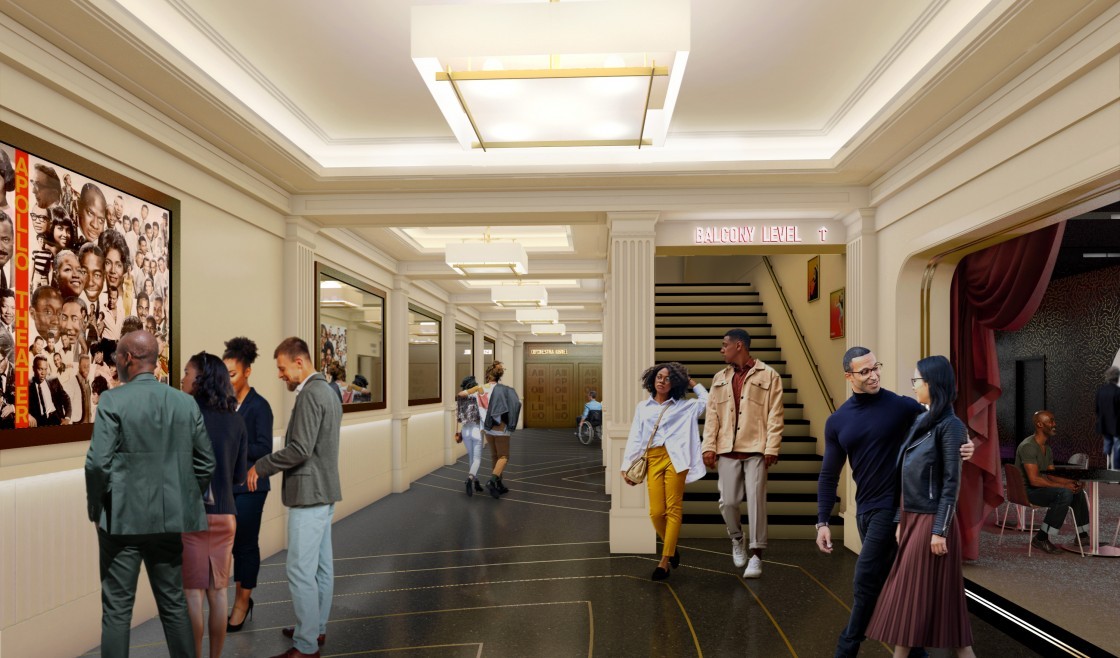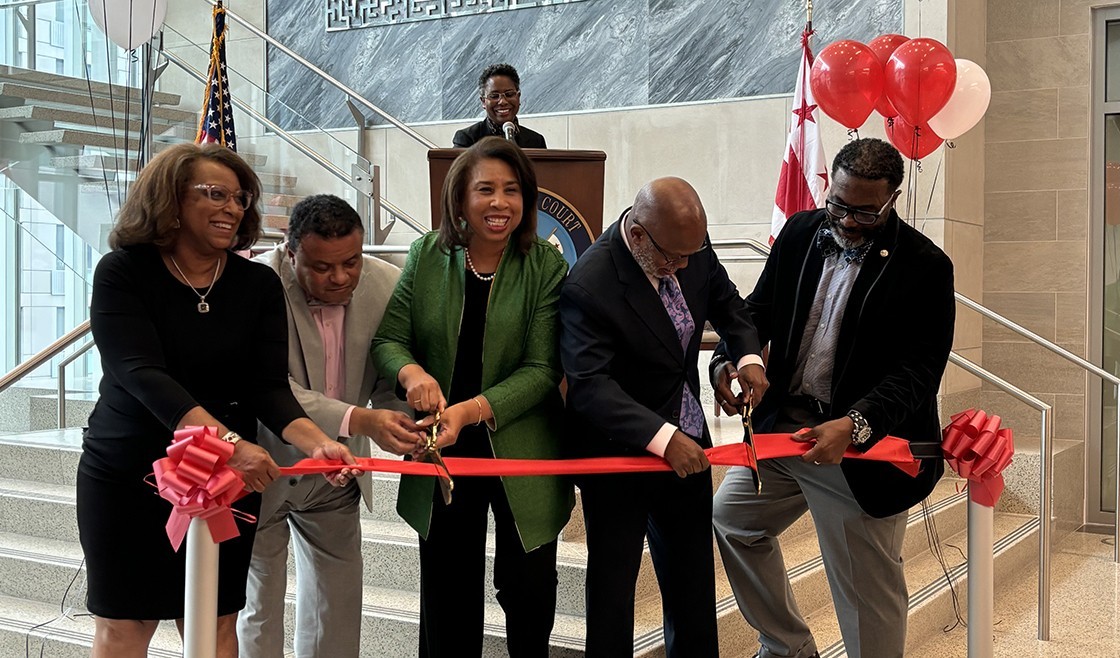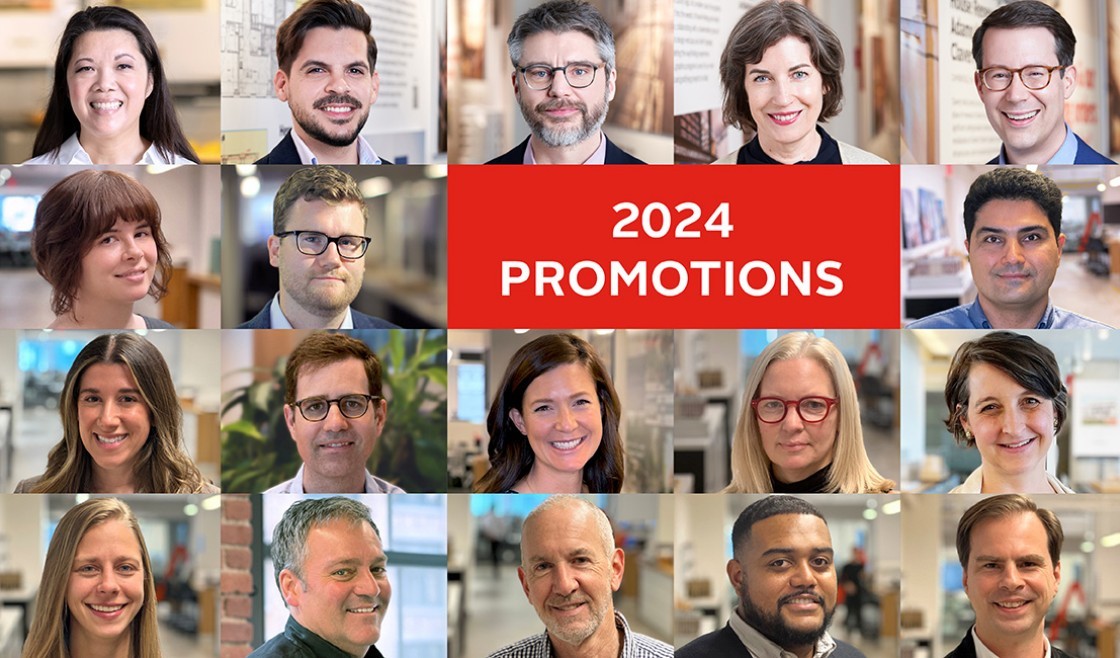The Apollo unveils designs for full-scale revitalization of its Historic Theater
New York, NY—August 7, 2024—The Apollo today unveiled the design for the first full-scale restoration, renovation, and modernization of its iconic Historic Theater by Beyer Blinder Belle Architects & Planners with consultants Charcoalblue, Flyleaf Creative, and Higgins Quasebarth & Partners.
The project, which follows the opening of The Apollo’s Stages at the Victoria earlier this year, is part of the comprehensive Apollo Rising 2.0 Capital Campaign. The project honors the legacy of The Apollo while enhancing the audience experience with a renovated and expanded lobby with a café and bar for community gatherings and performances, new and restored seating, significant upgrades to backstage areas for artists, a revitalized, globally recognized historic Apollo marquee, and more. The historic “Wall of Fame” that celebrates the artists who have played The Apollo will be digitized and enhanced with The Apollo’s extensive archives, creating an engaging, interactive experience for visitors. The irreplaceable signature wall, which houses decades of artist signatures from when they performed, will also be preserved. Construction on the theater—which first opened in 1914 and was renamed The Apollo in 1934—is expected to begin fall 2024 and will be undertaken in phases until its completion in spring 2026. The Apollo will continue performances throughout the process, alternating the use of its new Stages at the Victoria Theater, Soundstage, and Historic Theater.
Following the opening of The Apollo Stages at the Victoria Theater, the first expansion in the nonprofit’s 90-year history, the Historic Theater renovation and expansion further enhances The Apollo’s mission to champion artists, shepherd the Black cultural narrative, and provide vibrant, artistic, and community programs that build on the cultural heritage of Harlem.
The project team is led by Beyer Blinder Belle Architects & Planners, with consultants Charcoalblue, Flyleaf Creative, and Consigli Construction. Renderings for the Historic Theater are available here.
The Apollo’s Historic Theater last underwent minor renovations in the early 1980s, after which the exterior and portions of the theater’s interior were designated as New York City Landmarks. Since that time, New York’s Landmarks Preservation Commission has approved limited work throughout the building. On August 6, 2024, it approved this design.
“The revitalization and restoration of the Historic Theatre is a deeply exciting undertaking—one that we could not do without the tremendous support of our collaborators, our community, and everyone who has sat in the audience of The Apollo and recognized it as the gravitational center of Black culture and art,” said Chairman of the Board Charles Phillips. “The continued support of our Apollo Rising 2.0 Capital Campaign has opened the door to a new era, and we cannot wait to step through.”
“This is a momentous year for The Apollo, as we continue the institution’s expansion and modernization for the first time in the organization’s history. While ushering us into our next chapter, the changes we are making to the Historic Theater also honor the rich legacy and the creative magic that courses through the theater and pay homage to the many legends who have been propelled into stardom by The Apollo. After 90 years, we are ensuring that The Apollo is well-equipped to serve the next generations of artists and audiences alike for the next century,” said Apollo President and CEO Michelle Ebanks.
“Evoking the spirit and classical detail of the Theater in the 1930s when it became the iconic Apollo as it is known today, these upgrades are derived from the same historic materials, including its decorative plaster and terrazzo, but transfused with contemporary design,” said Christopher Cowan, Principal at Beyer Blinder Belle Architects & Planners. “The repairs and restorations will enhance accessibility, lighting, and mechanical systems in a way that takes preservation into account, but also revitalizes its entire elements. New seating and acoustical panels will allow the auditorium space to operate better for audiences and artists alike.”
First opened in 1914 and renamed the Apollo Theater twenty years later, the theater has played a major role in the evolution of jazz, swing, bebop, R&B, gospel, blues, soul, and hip-hop, and helped launch the careers of musical greats such as Ella Fitzgerald, Sarah Vaughan, Billie Holiday, James Brown, Gladys Knight, Luther Vandross, D’Angelo, Lauryn Hill, and others. Today, it continues to build on its mission to create a new American performing arts canon and support artistic creation and collaboration in Harlem. An international, national, state, and city landmark, The Apollo has long served as a cultural cornerstone in the community and attracts visitors from around New York and across the globe to Harlem, generating economic activity and adding to Manhattan’s wealth of world-class artistic offerings.
Revitalization Design Details
The Historic Theater renovation and restoration include fully revitalized interior and exterior finishes, such as:
A fully renovated expanded lobby that will double its size and be visually open to the exterior, enhancing transparency and welcoming in the community on 125th Street. The space is reimagined as an always-active destination, harkening back to the historic architecture of the theater’s original lobby.
The entrance will be more welcoming for audiences, with significantly more space, brighter and warmer lighting, and the theater’s original framed murals of iconic stars including James Brown, Cab Calloway, Aretha Franklin, Dick Gregory, Billie Holiday, Martha Reeves, and The Staple Singers on the entrance walls will be digitized into an interactive installation where audiences can engage with past performances and historic moments that have happened on The Apollo’s Historic Stage.
A newly designed café, bar, and retail space located adjacent to the historic lobby will also be open to the public throughout the day, and will host community gatherings and small-scale performances, offering audiences, tourists, and locals alike the opportunity to mix and mingle and experience the Apollo magic anytime
Details in the interior architecture will reference The Apollo’s iconic marquee, blade sign, and brand through brass inlay pattern in the terrazzo floor; brass finish metal clad theater doors; decorative metal panels behind the bar; and large faux neon “A” sign in the bar
Repair and restoration of the iconic façade and marquee, including upgrades to new LED technology
All new seats on the Historic Theater’s orchestra level with a rearranged floor design that adds 29 additional seats on the orchestra floor, an equivalent number of which will be removed from the balcony and mezzanine floors to maintain seating capacity. Balcony and mezzanine seats will be refurbished.
Full renovations to the Historic Theater Soundstage with expanded seating and production focused on music and comedy programming in a cabaret style, with the possibility to host daytime meetings and presentations, commercial shoots, private parties, and more
Enhanced dressing rooms for artists
An improved AV, lighting, acoustics, and sound distribution system
Modernization of elevators and restrooms
Upgraded HVAC, fire suppression, elevator, and technology systems
Updated administrative office space
Timeline
The complete renovation timeline is phased so that only one of The Apollo’s stages will be closed at any given time. The construction will begin with the Soundstage in the Historic Theater, which audiences know best as the home to mainstay programs that support emerging artists including Music Cafe and Comedy Club at The Apollo, while the mainstage within the Historic Theater remains open and operating. The Soundstage renovation will be complete in summer 2025, when construction moves onto the Mainstage, lobby and entrance in July 2025. While construction begins on the Mainstage, the Soundstage and Stages at the Victoria will be open for events and performances. The Historic Theater Mainstage, lobby, and entrance renovation and revitalization is expected to be completed in spring 2026.
Project Partners
The project is being led by Beyer Blinder Belle Architects & Planners, in collaboration with consultants Charcoalblue (theater design and acoustic), Flyleaf Creative (signage design), and Consigli Construction (contractors). Additional collaborators include:
Cline Betteridge Bernstein, lighting design
Gace Consulting Engineers, structural engineers
Higgins Quasebarth & Partners, historic preservation
Production & Performance Facility Consulting, theater consultants
About The Apollo Stages at the Victoria Theater
Just down the street on 125th from The Apollo’s Historic Theater is the Apollo Stages at the Victoria. The new 25,000-square-foot facility, designed by KGA (Kostow Greenwood Architects), includes two theaters, a central lobby and main floor exhibition gallery space that serve as convening points for patrons, and administrative offices for Apollo staff, visiting artists, and artistic collaborators. The theaters and offices inhabit the third and fourth floors of the revitalized mixed-use Victoria Theater building, which also includes retails spaces and a hotel.
The new 199- and 99-seat studio theaters, the latter named after former Apollo President Jonelle Procope who stepped down in 2023 after leading the organization for two decades, are designed for theatrical productions, live music performances, film screenings, special events, and recordings. Both theaters are flat-floor venues with acoustically isolated slabs and resilient sprung dance floors—as well as dressing rooms and chorus rooms. Notably, The Apollo has introduced across both theaters, a custom-built, retractable seating system to allow for multiple configurations, making it adaptable to the needs of performers and collaborators.
The use of these spaces will also be opened up to the community, offering subsidized use for cultural partners and artists seeking resources to develop their craft.
About the Apollo
The legendary Apollo—the performing arts center and soul of American culture—plays a vital role in cultivating emerging artists and launching legends. Since its founding, The Apollo has served as a center of innovation and a creative catalyst for Harlem, the city of New York, and the world. In 2024, The Apollo opened The Apollo Stages at the Victoria Theater and began renovations on its Historic Theater, marking the first ever expansion and renovation of The Apollo in its nearly 90-year history.
With music at its core, The Apollo’s programming extends to dance, theater, spoken word, and more. This includes the world premiere of the theatrical adaptation of Ta-Nehisi Coates’s Between the World and Me and the New York premiere of the opera We Shall Not Be Moved; special programs such as the blockbuster concert Bruno Mars Live at the Apollo; 100: The Apollo Celebrates Ella; and the annual Africa Now! Festival. The non-profit Apollo is a performing arts presenter, commissioner, and collaborator that also produces festivals, large-scale dance and musical works organized around a set of core initiatives that celebrate and extend The Apollo’s legacy through a contemporary lens, including the Women of the World (WOW) Festival as well as other multidisciplinary collaborations with partner organizations.
Since introducing the first Amateur Night contests in 1934, The Apollo has served as a testing ground for new artists working across a variety of art forms and has ushered in the emergence of many new musical genres—including jazz, swing, bebop, R&B, gospel, blues, soul, and hip-hop. Among the countless legendary performers who launched their careers at The Apollo are Ella Fitzgerald, Sarah Vaughan, Billie Holiday, James Brown, Stevie Wonder, Gladys Knight, Luther Vandross, H.E.R. D’Angelo, Lauryn Hill, Jazmine Sullivan, Machine Gun Kelly, and Miri Ben Ari; and The Apollo’s forward-looking artistic vision continues to build on this legacy. For more information about The Apollo, visit www.ApolloTheater.org.
For more information, please contact:
The Apollo
Sydney Edwards
press@apollotheater.org
Resnicow and Associates
Josh Balber / Destanie Martin-Johnson
apollo@resnicow.com
212-671-5175 / 212-671-5172


